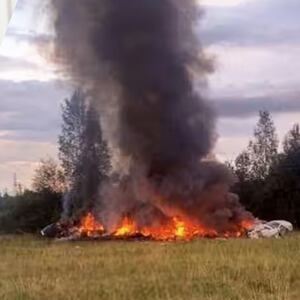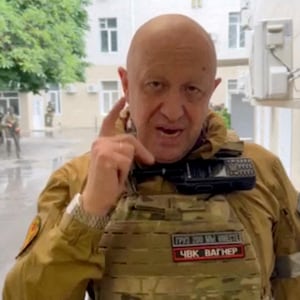Russian mercenary chief Yevgeny Prigozhin has left uncertainty in the wake of his presumed fiery demise in a plane crash on Wednesday, with his reported death raising questions about what the future holds for thousands of fighters that served in his paramilitary group, Wagner.
Prigozhin was listed as one of the passengers on board the Embraer business jet that crashed in the Tver region of Russia, according to Russia’s federal aviation organization. The BBC said confirmation that Prigozhin’s name appeared on the passenger list was “unusually quick” and had “raised eyebrows.”
Prigozhin, 62, has long been a symbol of violence and chaos among those most impacted by the relentless schemes of Wagner in the Middle East, Africa, and Europe. Once known as “Putin’s chef” for owning the Kremlin’s catering company, his legacy is now intertwined with the countless human rights abuse allegations that came with doing President Vladimir Putin’s dirty work.
Ultimately, his loud mouth—from the moment he publicly criticized the Kremlin, to his failed revolt in Moscow, to his final video message boasting about his fighters just a day before he boarded that plane—may have spelled his doom. After marching on Moscow to contest the way the Kremlin was running war operations in Ukraine in June, longtime Putin watchers surmised that Putin’s hitmen would likely have their knives out for Prigozhin before long.
And while the future of Wagner Group operations—and all of Prigozhin’s sweeping empire, from mining to propaganda operations on behalf of Moscow—hangs in the balance, it may not be curtains just yet for the remaining appendages of Prigozhin’s operations, even if they take on new forms.
The future of the Wagner Group will likely fall to pro-Putin hands at this point, Ronald Marks, a former CIA clandestine service officer and special assistant to the assistant director of central intelligence for military affairs, told The Daily Beast.
“The Wagner Group will be taken over by someone who is friendly to Putin or certainly who will suck up to Putin at this point,” Marks predicted.
In his view, the likely reason Putin opted to wait a few weeks before killing Prigozhin following the staged revolt in Russia was to get his ducks in a row on who would succeed him.
“If I’m Putin at this point I’m lining up my power behind the guys who will replace Prigozhin… besides, a Russia plane crash is very sad,” Marks said, noting that Russian critics are constantly dying for suspicious and unexplained reasons, such as falling out windows. “Russian windows are very difficult to open and shut, they throw people out the window, staircases are slippery, things happen—which you want in the old spy world: plausible deniability.”

Yevgeny Prigozhin gives an address in camouflage and with a weapon in his hands in a desert area at an unknown location, in this still image taken from video possibly shot in Africa and published August 21, 2023.
PMC Wagner via Telegram via ReutersSean McFate, an expert on mercenaries and a former paratrooper and officer in the Army’s 82nd Airborne Division, also believes that the Wagner model will likely live on, despite Prigozhin’s fate.
“Prigozhin might be dead but I don’t think his business model is. It makes too much money and serves Russia’s hegemonic interests,” McFate told The Daily Beast. “Expect someone else in Wagner to step up and take charge, probably sanctioned by Putin. Also, expect copycats on the horizon.”
Not everyone familiar with how Wagner operates thinks the transition will be so smooth.
In Belarus, the stakes of Wagner’s next move are sky-high. Almost 6,000 Wagner fighters relocated to the country in the aftermath of Prigozhin’s mutiny, thanks to a deal made between Putin, Belarusian President Alexander Lukashenko, and the mercenary boss.
The decision to move the fighters to Belarus—under Lukashenko, one of Putin’s closest allies—has sparked panic on the country’s borders in recent weeks. Officials in North Atlantic Treaty Organization (NATO) member states like Poland have been raising alarm about the hybrid threats posed by Belarus and Russia and the threat of those fighters crossing their borders and wreaking havoc in their countries.
The relocation of Wagner fighters to Belarus has raised questions over who exactly is in charge of their operations—whether it be Putin orchestrating behind the scenes, Lukashenko operating as a Putin puppet to coordinate Wagner movements, or Prigozhin running the show.
Now, with the apparent death of Prigozhin, the hope among political circles opposing Lukashenko and his strengthening alliance with Moscow is that Wagner mercenaries will be shaken, and any potential Wagner threats inside Belarus—and to neighboring countries—will die down.
For Franak Viacorka, the chief political adviser of Belarusian democratic opposition leader Sviatlana Tsikhanouskaya, Prigozhin’s absence “can change many things.”
“Wagner Group cannot exist without its leader,” Viacorka told The Daily Beast. “It was built on Prigozhin’s charisma, Prigozhin’s power, and Prigozhin's ability to find opportunities for them. This group… has lost a lot.”
For the opposition government, Russia’s tightening grip on their country was only made more clear when Lukashenko, often known as the last dictator in Europe, agreed to host Wagner mercenaries on Belarusian soil.
“Hopefully we will see some changes in Wagner’s presence in Belarus,” They could leave Belarus, could be transformed, could disappear. We are watching closely,” Viacorka said. “We are gathering right now information about the military base where Wagner people were present in Belarus.”
Although Viacorka believes that the death of Prigozhin, whom he describes as the “security guarantee” and “defender” of his fighters, will definitely crater the group’s morale, he predicted that if that is not enough to weaken their presence in Belarus, Lukashenko himself probably will mismanage Wagner moving forward, should some of the group remain in Belarus.
“It’s also likely that Lukashenko will be able to take over Wagner Group in Belarus and he will not be able to pay them, of course, so it changes a lot,” he said.
Already, Wagner fighters have been leaving Belarus in droves to fight elsewhere due to low pay compared to earlier contracts with Prigozhin, according to a recent report from the Special Operations Forces of Ukraine.
The death of Prigozhin may also give the Belarusian strongman pause in thinking about his alliance with Putin, Viacorka said.
“Lukashenko is also scared a lot because he could be on that plane metaphorically. He could be next as well. Putin showed clearly what he will be doing with those who are not loyal enough,” Viacorka told The Daily Beast. “It also sends a signal to people around Lukashenko that they could lose protection at any moment. So definitely it can spark some turbulence.”
Those on the front lines of the fight against Russian influence in Belarus are looking to exploit that moment of weakness.
It’s a “window of opportunity,” Viacorka said. “Prigozhin will not be missed in our country by our people.”
The leaderless Wagner fighters, meanwhile, will probably be watching their back in the aftermath of Prigozhin’s death—regardless of the “security guarantees” that came with the mutiny deal, the opposition official explained.
“It’s Lukashenko who said that he brokered the deal with Putin and he promised Prigozhin safety. But there is no safety when you are in Lukashenko’s and Putin’s hands. They cannot give any promises. And their deals and agreements with them mean nothing,” he said. “The news about the death of Prigozhin will scare the mercenaries a lot.”








